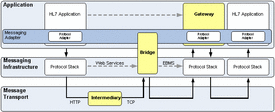This wiki has undergone a migration to Confluence found Here
Difference between revisions of "Gateway"
Jump to navigation
Jump to search
Rene spronk (talk | contribs) |
|||
| Line 3: | Line 3: | ||
A '''Gateway''' is an HL7-artefacts aware application which executes business rules, and forwards/ copies/ amends/ transforms interactions (messages or batched messages) based on those business rules. In order to perform those business rules, a Gateway is always an HL7 application that is listed as the receiver of the incoming interactions and sender of the outgoing interactions (just like any other [[HL7 Application]]). | A '''Gateway''' is an HL7-artefacts aware application which executes business rules, and forwards/ copies/ amends/ transforms interactions (messages or batched messages) based on those business rules. In order to perform those business rules, a Gateway is always an HL7 application that is listed as the receiver of the incoming interactions and sender of the outgoing interactions (just like any other [[HL7 Application]]). | ||
*Question (Phoenix Action Item, refering to ATS Line item 52) - Are the Gateways always trusted? Is there a use case or a possibility of a highly distributed environment where Gateways are *not* trusted? | *Question (Phoenix Action Item, refering to ATS Line item 52) - Are the Gateways always trusted? Is there a use case or a possibility of a highly distributed environment where Gateways are *not* trusted? | ||
| − | **(Miroslav) I feel that this should be out of the scope of the ATS discussion, since this very much depends on the business scenarios. For the sake of the argument, I see Gateways the same way like any other HL7 applications, which should but don't have to be trusted in all the cases. This depends on business level contracts, | + | **(Miroslav) I feel that this should be out of the scope of the ATS discussion, since this very much depends on the business scenarios. For the sake of the argument, I see Gateways the same way like any other HL7 applications, which should but don't have to be trusted in all the cases. This depends on business level contracts, network and application configuration, security provisioning etc. If we need to put something in the doc, I'd suggest that we say that "the Gateways, like any other sending HL7 applications should always be trusted, however this depends on many different network/application configuration parameters. What implementors need to be aware of is that if a Gateway is not trusted, Receivers will probably drop all further communication with the Gateway from their side. |
*Question - what is the difference between a "gateway" and a "registry"? [[User:Charliemccay|Charliemccay]] 05:17, 10 Aug 2006 (CDT) | *Question - what is the difference between a "gateway" and a "registry"? [[User:Charliemccay|Charliemccay]] 05:17, 10 Aug 2006 (CDT) | ||
**See [[Registry]]. Under some circumstances a Registry could possible deemed to be a Gateway, it depends on the functionality that is performed by the registry. Gateway is meant to be a middleware role. | **See [[Registry]]. Under some circumstances a Registry could possible deemed to be a Gateway, it depends on the functionality that is performed by the registry. Gateway is meant to be a middleware role. | ||
Revision as of 19:35, 10 September 2006
A Gateway is an HL7-artefacts aware application which executes business rules, and forwards/ copies/ amends/ transforms interactions (messages or batched messages) based on those business rules. In order to perform those business rules, a Gateway is always an HL7 application that is listed as the receiver of the incoming interactions and sender of the outgoing interactions (just like any other HL7 Application).
- Question (Phoenix Action Item, refering to ATS Line item 52) - Are the Gateways always trusted? Is there a use case or a possibility of a highly distributed environment where Gateways are *not* trusted?
- (Miroslav) I feel that this should be out of the scope of the ATS discussion, since this very much depends on the business scenarios. For the sake of the argument, I see Gateways the same way like any other HL7 applications, which should but don't have to be trusted in all the cases. This depends on business level contracts, network and application configuration, security provisioning etc. If we need to put something in the doc, I'd suggest that we say that "the Gateways, like any other sending HL7 applications should always be trusted, however this depends on many different network/application configuration parameters. What implementors need to be aware of is that if a Gateway is not trusted, Receivers will probably drop all further communication with the Gateway from their side.
- Question - what is the difference between a "gateway" and a "registry"? Charliemccay 05:17, 10 Aug 2006 (CDT)
- See Registry. Under some circumstances a Registry could possible deemed to be a Gateway, it depends on the functionality that is performed by the registry. Gateway is meant to be a middleware role.
Back to the Open ATS Issues
